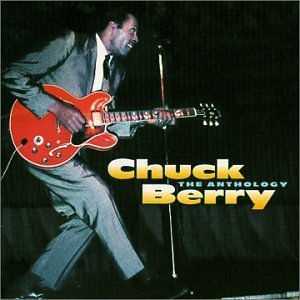
Anthology is a two-disc compilation album by American rock and roll musician Chuck Berry released on July 27, 2000, by Chess Records. It duplicates in its entirety the previous anthology The Great Twenty-Eight ranked at No. 21 on the Rolling Stone 500 greatest all time albums list, as well as the entirety of the later Definitive Collection issued in 2006 as part of the Universal series. The album was later reissued and packaged in 2005 as part of the Universal Records Gold series, and simply retitled Gold. It charted at No. 110 in the UK Albums Chart.
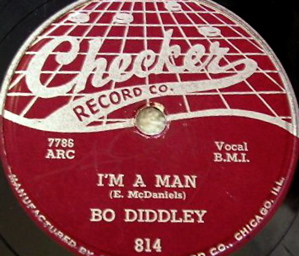
"I'm a Man" is a rhythm and blues song written and recorded by Bo Diddley in 1955. Inspired by an earlier blues song, it was one of his first hits. "I'm a Man" has been recorded by a variety of artists, including the Yardbirds, who adapted it in an upbeat rock style.

"Bo Diddley" is a song by American rock and roll pioneer Bo Diddley. It introduced the rhythm that became known as the Bo Diddley beat and topped the Billboard R&B chart for two weeks in 1955. The song is included on many of Diddley's compilation albums including Bo Diddley (1958) and His Best (1997). Buddy Holly recorded a version that became his highest-charting single in the UK.

Go Bo Diddley is the second album by American rock and roll musician Bo Diddley, released in July 1959. The album was Bo's first studio album that included some material that hadn't been prereleased on singles, and his first LP for Checker Records. In 2003, Rolling Stone ranked it number 214 on its The 500 Greatest Albums of All Time, and 216 in a 2012 revised list.

"Who Do You Love?" is a song written by American rock and roll pioneer Bo Diddley. Recorded in 1956, it is one of his most popular and enduring works. The song represents one of Bo Diddley's strongest lyrical efforts and uses a combination of hoodoo-type imagery and boasting. It is an upbeat rocker, but the original did not use the signature Bo Diddley beat rhythm.
"Hey! Bo Diddley" is Bo Diddley's eighth single released by Checker Records and was released as a single in April 1957 by Checker Records. The single's B side was "Mona".
"Road Runner" is a 12-bar blues song performed by American rock and roll performer Bo Diddley, originally released as a single by Checker Records in January 1960, and later released on the LP record Bo Diddley in the Spotlight. The song reached #20 on Billboard magazine's Hot R&B Sides chart, and #75 on the Hot 100. The song has since been recorded by many artists.

Have Guitar Will Travel is the third studio album by rock and roll musician Bo Diddley. It was released on the Checker Records label in 1960.

Lafayette Leake was an American blues and jazz pianist, organist, vocalist and composer who played for Chess Records as a session musician, and as a member of the Big Three Trio, during the formative years of Chicago blues. He played piano on many of Chuck Berry's recordings.
Joseph Leon "Jody" Williams was an American blues guitarist and singer. His singular guitar playing, marked by flamboyant string-bending, imaginative chord voicings and a distinctive tone, was influential in the Chicago blues scene of the 1950s.
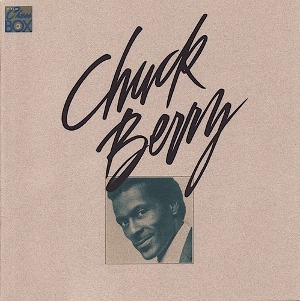
The Chess Box is a compact disc box set compilation by Chuck Berry. It is one in a series of box sets issued by MCA/Chess in the late 1980s. The Chuck Berry set is the most prominent of these, having won a Grammy Award for Best Historical Album in 1989. Berry's Chess Box was reissued on vinyl in 1990.

"Before You Accuse Me" (also known as "Before You Accuse Me (Take a Look at Yourself)") is a song written and recorded by American musician Bo Diddley in 1957. The song was originally released as the B-side to Diddley's "Say Bossman" and included on his self-titled debut album in 1958. Backing Diddley on vocal and guitar on the original recording were Jody Williams on guitar, Willie Dixon on bass, and Frank Kirkland on drums. The song has also been recorded by several other artists, such as Creedence Clearwater Revival and Eric Clapton.
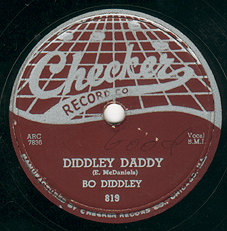
"Diddley Daddy" is a song by Bo Diddley. The song was issued as a single on Checker Records in June 1955. His second single, it followed on the heels of the success of the eponymous "Bo Diddley." The song spent four weeks on the Billboard R&B chart in the summer of 1955, peaking at No. 11.

Bo Diddley Is a Gunslinger is the fifth studio album by American rock and roll pioneer Bo Diddley released in December 1960 by Checker Records. The album title comes from the album's first track called "Gunslinger" and the cover art has Bo Diddley dressed in Western-style clothing. The songs for Bo Diddley is a Gunslinger were recorded from October 1959 to February 1960. Several tracks of interest are "Sixteen Tons" which Bo was supposed to perform on The Ed Sullivan Show, the title track, and "Diddling".

His Best is a 1997 greatest hits compilation album by American rock and roll icon Bo Diddley released by Chess and MCA Records on April 8, 1997. The album was re-released by Geffen Records on April 17, 2007 as The Definitive Collection with a different album cover. The Definitive Collection reached #2 on Billboard magazine's Blues Albums chart on June 21, 2008, which was the week that the album debuted on the charts.

"Pretty Thing" is a 1955 song written by Bo Diddley and Willie Dixon and performed by Bo Diddley. The song was Diddley's third single release through Checker Records after "Diddley Daddy". In 1963, the song was released in the United Kingdom where it became Diddley's first of only two songs appearing on the UK Singles Chart, the other single being "Hey Good Lookin'".

His Best is a greatest hits album by Chicago blues harmonica player Little Walter, released on June 17, 1997 by MCA and Chess Records as a part of The Chess 50th Anniversary Collection. The album is seen as the CD successor to the 1958 The Best of Little Walter and features ten of the songs from that album.
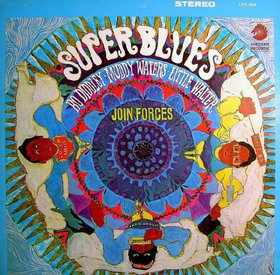
Super Blues is a 1967 studio album by a blues supergroup consisting of Bo Diddley, Muddy Waters, and Little Walter. The album was released in both mono and stereo formats by Checker Records in June 1967. A follow-up album The Super Super Blues Band was released later that year and featured Howlin' Wolf replacing Little Walter.

"You Can't Judge a Book by the Cover" is a 1962 song by rock and roll pioneer Bo Diddley. Written by Willie Dixon, the song was one of Diddley's last record chart hits. Unlike many of his well-known songs, "You Can't Judge a Book by the Cover" does not rely on the Bo Diddley beat. A variety of rock and other performers have recorded renditions of the song.
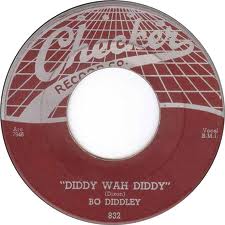
"Diddy Wah Diddy" is a song written by Willie Dixon and Ellas McDaniel, known as Bo Diddley, and recorded by the latter in 1956. The song shares only its title with Blind Blake's song "Diddie Wah Diddie" recorded in 1929. Over the years, the Bo Diddley song has been covered by many bands and artists, including the Astronauts, Captain Beefheart and his Magic Band, the Remains, the Twilights, Taj Mahal, the Sonics, the Fabulous Thunderbirds, Ty Segall Band, and the Blues Band among others.

















